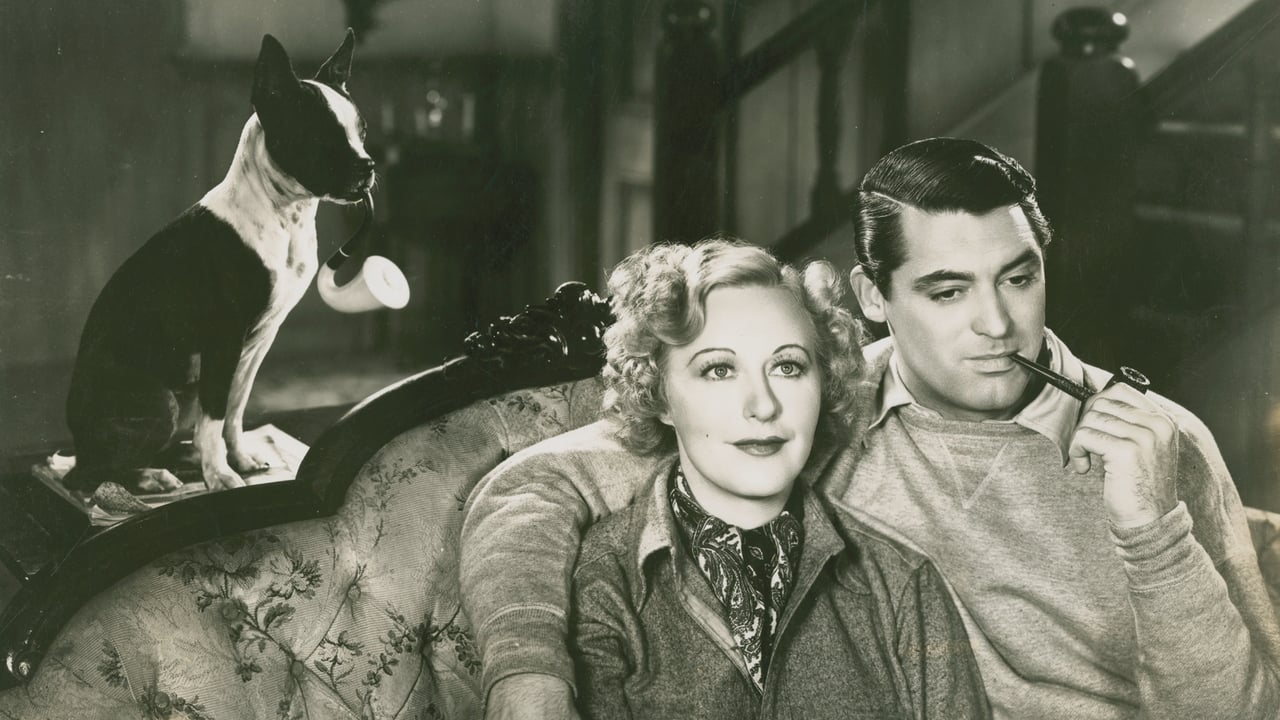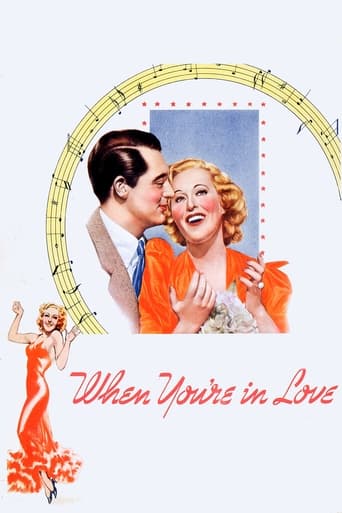Perry Kate
Very very predictable, including the post credit scene !!!
Brightlyme
i know i wasted 90 mins of my life.
Cleveronix
A different way of telling a story
Ava-Grace Willis
Story: It's very simple but honestly that is fine.
TheLittleSongbird
The premise for 'When You're in Love' had a lot of potential, Grace Moore was a likable singer/actress who achieved some success as a film star but that was short-lived, Cary Grant was one of the cinema all-time greats and Robert Riskin was a brilliant screen-writers.Any film also, and there's plenty of them around, that tries to give opera (a medium that has been a lifelong passion, but sadly its appeal has become generally increasingly more limited over the years) more popularity and make it more accessible is worthy of some credit. Somehow however, despite some very good things, 'When You're in Love' falls short of its potential.Moore herself is sexy and a very likable and charming screen presence. She also sings very well, especially in "Sibonay". Though "Vissi D'Arte" doesn't sound right for her voice (prefer a bigger and richer voice for Tosca) and doesn't feel right within the film either. 'When You're in Love' doesn't see anywhere near the best of Grant, but his customary urbane charm can be seen in bucket loads and he and Moore do share a sweet chemistry. Aline MacMahon comes very close to stealing the film, her good-nature and sass reminding one of Eve Arden.'When You're in Love' is beautifully shot and sumptuously designed. The music is wonderful, whether pre-existing or written especially for the film, and along with Moore the star of the film, with "Sibonay", "Your Song" and "Minnie the Moocher" coming off best. Choreographically, "Minnie the Moocher" is energetic and enormous fun, by far the best musical number in staging and choreography, and Moore certainly does let her hair down. The scene in the cabin is a lovely scene too.On the other hand, Riskin's talent as a screen-writer is not matched at all by his direction, showing that there was a reason as to why this was the first and only time in the director's chair. Stylistically it's fine, but too much of it dramatically and pulse-wise screams of inexperience and too many of the musical numbers are staged indifferently or bizarrely (so much so that the exuberant "Minnie the Moocher" feels overblown in comparison), Schubert's "Serenade" is an insulting mix of both especially. The story seemed like it would work on paper, but too much of it is bland and implausible with the final act and ending taking a turn for the worse in lack of momentum of ridiculousness.There are scenes and decisions that begged for explanation as to why they happened, especially why "Serenade" was staged the way it was, the placement of "Vissi D'Arte" and much of the pivotal romance, but they never came. While the chemistry itself is sweet, 'When You're in Love' is written in such a flat way (no sparkling bubbles here in this script, just a lot of substance-less froth that becomes dull, strange and too sugary) that one is never fully invested in the romance itself.In conclusion, works well as a Grace Moore vehicle and anybody wanting good music will not be disappointed. There are far better examples of Grant and Riskin's talents elsewhere other than here however. 5/10 Bethany Cox
MartinHafer
Grace Moore was a very odd leading lady in Hollywood. She was only moderately pretty and her biggest asset was her operatic songs...and Columbia Studios tried for several years, unsuccessfully, to make her a star. However, her career in Hollywood only lasted nine films until they gave up. Don't feel sorry for her, however, as Moore was a very accomplished singer and was world famous for her performances...not bad for a girl from Tennessee!This is one of Moore's last films and it's pretty much the same sort of formula they'd use in the next movie, "I'll Take Romance"...though this later film is a bit better. In this case, she and Cary Grant have an on again off again relationship until ultimately she realizes what a fine catch he is and they live happily ever after. The story is predictable but could have worked if she didn't keep breaking into song. These are NOT the normal plebeian sort of songs most folks enjoy but operatic...and they do NOT age well. In fact, they make the film a real chore to finish. The only reason I did is that I would like to one day say I've seen all of Cary Grant's films...even the bad ones. And, sadly, this one is pretty bad.
richard-1787
Robert Riskin, who wrote the script for this movie, also wrote the scripts for Platinum Blonde (1931), It Happened One Night (1934), Mr. Deeds Goes to Town (1936), Lost Horizon (1937), You Can't Take It with You (1938), Meet John Doe (1941), and many other of the great movie classics of the 1930s. If I start by listing those masterpieces, it is to wonder how he could have written something as poor as this script. Because it is the script, and Riskin's sole turn at being a movie director, that sink this movie. The first part is very poor, the middle not as bad, but then the end, with the god-awful music festival done in neo-Grecian art deco, destroys any chance of actually respecting this movie. HOW could anyone have thought that the last number, a piece that talks about a "simple song" but is staged with a cast of hundreds in elaborate 18th century ball gowns and what not, would not look ridiculous? It's a shame that the script and direction are so often so poor, because there are good things in this movie.Moore's singing of Sibonay early in the movie is magical. It's a great number, brought off wonderfully by Moore at her very best. The staging isn't great, but it doesn't sink what is really a great five minutes.There is also a very effective 5 minutes dramatically when Cary Grant and Moore sit before a fire in his cabin. The scene comes off as very natural, and very convincing - one of the few such natural moments in the movie, unfortunately.Several of the other musical numbers, done very simply, are very moving. The song Moore sings to the children about the wooden doll, her song out in nature (which then gets travestied as the finale at the music festival), her singing of a folk-song while lying on her back in the cabin. And while she was no Cab Calloway, she does a nice job with Minnie the Moocher.But Riskin's direction kills a good performance of Shubert's Serenade, done, for no apparent reason, in neo-Grecian art-deco. And Moore's performance of Vissi d'arte from Tosca under the opening credits is never explained and leads nowhere.The dramatic crux of the movie happens only because Moore's character fails to explain to Cary Grant's why she has to sing at the music festival. It makes no sense that she would not have explained this.So, in summary: there are some golden nuggets in this movie, mostly the musical numbers - but not all of them. Most of the rest of it is poor.Very definitely inferior to Moore's other movie from 1937, I'll Take Romance, which suggests that Moore could have made some good movies if she had had better directors and material.
barbecuedbanana
I quite enjoyed this as something to watch in the afternoon with a cup of tea and a biscuit. This makes me sound about 110 but I'm only just over 40 LOL Nice story - I've got Skyplus so I could fast forward over the horrible singing. The Opera Star's side kick was definitely the best part of the film, she was smart and the screen lit up whenever she was in a scene.But in the scene where all the kids come down from the Music School upstairs to listen at the feet of the 'Queen' - was that Shirley Temple or not? It looked like her to me, did they have look alikes in those days? Not something to watch if there's anything good on instead.

